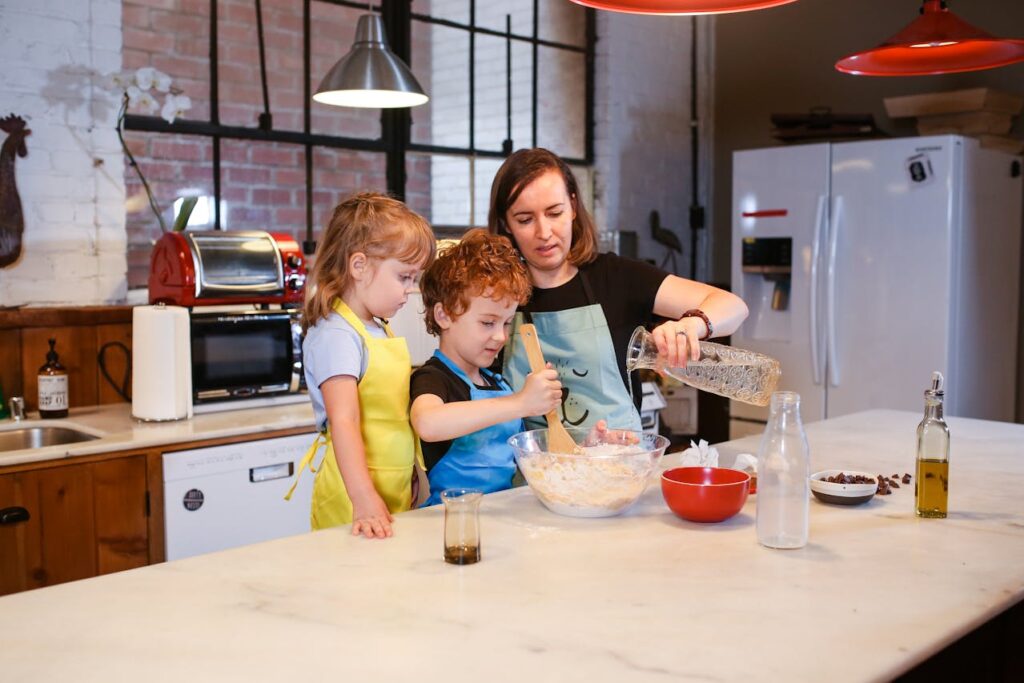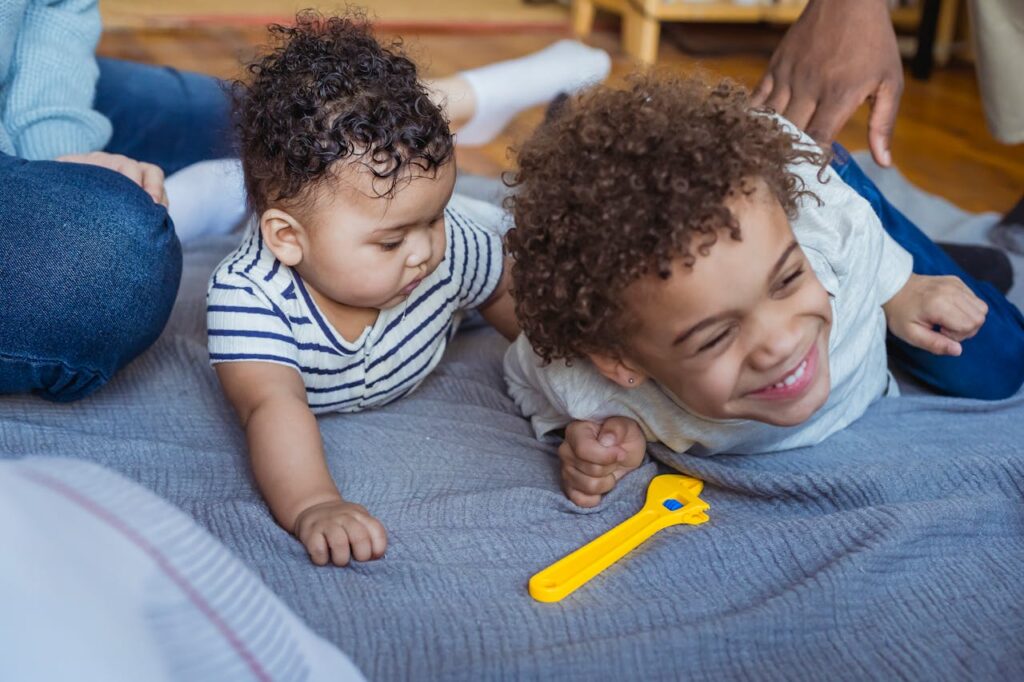When a family has two or more children, there is always a difference between older and younger siblings. Older siblings tend to take on more responsibility, while younger siblings are more likely to be coddled even after they become capable of independence. This eventually results in youngest child syndrome, a side effect of family dynamics that can cause your youngest child to become the “baby of the family” forever, and not always in a good way.
Youngest child syndrome is a set of traits and behaviors formed by youngest children who are constantly competing with older siblings for parental attention, being treated as “the baby” and being held to different standards compared to their older siblings.
As a parent, how can you reduce the risk of creating youngest child syndrome or handle the challenges if the situation has already ocurred? We are here to help you fairly parent all of your children and prepare your youngest child to take on the responsibility of adulthood.
Understanding Youngest Child Syndrome
Birth order has a subtle yet pervasive effect on the personality of children. The oldest child typically becomes the most serious and responsible. Middle child syndrome involves receiving neither the most attention nor the most leniency. The youngest sibling is likely to build their identity around being the youngest.
What is Youngest Child Syndrome?
Youngest child syndrome is a collection of personality traits and behaviors that commonly form in youngest children. Youngest children tend to be entertainers and manipulators. They tend to mature more slowly and rely on charm to get what they want or need because they have always been “the baby”. Depending on how family members and caregivers treat the youngest child, they may act spoiled and entitled, assume others will take responsibility, or never feel like they have a place in the adult family structure.
Youngest children may also be shaped by being the “last child”, with the extra doting and affection that can come from that. They may expect to be seen as special and excempt from rules their older siblings were held to, or they may feel they have special privileges from being the youngest.

Credit: Pexels
The Influence of Birth Order on Personality Development
Birth order tends to shape personalities across the sibling hierarchy. First-born children tend to take the lead, middle-born children are more likely to be overlooked, and youngest children are always babied. An only child may have traits similar to both a first-born and youngest child.
The birth order theory is shaped by how parental attention and sibling dynamics influence personality.
- Oldest Siblings
- Responsible and focused
- Parents were parenting “by the book”, so they are typically held to higher expectations and stricter rules
- The first to take on household chores
- Often asked to help with younger siblings
- Most likely to feel important
- Middle Siblings
- Middled and muddled
- Given neither the most or least of parental attention, resources, or expectations
- Held to middling expectations and rules, or even overlooked
- More likely to feel un-special
- Youngest Siblings
- Charming and childish
- Parents are tired and less worried, so are held to more relaxed expectations and rules
- Last to take on household chores, may be pampered as the “last child”
- Always feel behind their siblings, but may also be used to being taken care of by siblings
- Most likely to feel special
Psychological Traits of the Youngest Child
Youngest children often form specific psychological traits due to sibling dynamics and parenting styles.
- Attention-seeking: Parents have limited attention that is in short supply when youngest children come along. Youngest children often seek attention from parents and busy older siblings because they feel there is never enough to go around.
- Dependence: A youngest child constantly cared for and babied by parents and/or older siblings may never learn to do things on their own.
- Manipulation: Youngest children may learn to charm and manipulate to make up for being behind on mental and physical development in the family dynamic.
- Risk-Taking/ Lacking Self-Regulation: Youngest siblings often face the most lax expectations from parents and don’t learn the same self-control as older siblings, and may be more willing to take risks.
The Youngest Child Stereotypes
Youngest child syndrome also leads to a number of sterotypes that do not universally apply to each youngest sibling who is shaped by their family dynamic. In many situations, these stereotypes are even reinforced by the family which can prevent a youngest sibling from developing a healthy personality on their own.
- The Baby – Always needs help, infantilized and helpless, can’t do anything on their own.
- Spoiled – Always expects to get their way, may be a negative interpretation of having more relaxed rules than older siblings were held to.
- Manipulative – Using charm instead of capability, often overlooking that youngest siblings weren’t able to compete fairly with older siblings due to the age difference.
- Entertainer – charm and agreeableness from being the “family baby” in a positive but limiting family dynamic.
These stereotypes, when reinforced by family dynamics, can have a negative impact on self-esteem and identity, holding back youngest siblings from achieving their potential as independent, capable young people.
Emotional and Social Development
Youngest children are often more outgoing, social, and charming because they learned to rely on charm in their family dynamic. Older siblings may envy the youngest child’s seeming ease with friend groups and being the center of attention. However, the deep longing for attention can also lead to unhealthy attention-seeking behavior.
Long-Term Psychological Impact – Youngest Child Syndrome in Adults
Youngest child syndrome can seem cute in childhood and funny in teens, but it can have both positive and negative impacts when it manifests in adulthood. On the positive side, youngest children who grow up with the syndrome are more likely to be:
- Adventurous
- Outgoing
- Risk-tolerant
- Cheerful
On the negative side, youngest children in adulthood may show signs of:
- Attention-seeking and social anxiety
- Irresponsibility and risk-taking
- Impulsive behavior and poor self-regulation
- Highly sensitive to criticism
- Too giving without self-care
Parenting Challenges Associated with Youngest Child Syndrome
Youngest sibling syndrome is, at its heart, a response to natural parenting styles. The reason the behavior pattern is so prominant is because it’s normal for parents to treat their children a little differently based on birth order. You are more likely to be worried about everything during first-time parenting and strict with your oldest, then more relaxed (and tired) when raising your youngest. You are also more likely to be over-protective of your baby, try to overcompensate for past parenting mistakes, or ask older siblings to help raise the younger children.
There are good and bad things that come from these organic parenting patterns. Fortunately, with awareness and intention, you can ease the impact of sibling-order psychology and set up each one of your children for personal success.
1. Overprotectiveness and Its Consequences
First, be careful about being overprotective. It’s good to protect your children, but with freedom comes maturity, problem-solving, competence, and confidence. Youngest children need the opportunity to make mistakes, get hurt, and learn from their experiences just as much as their older siblings. Over-protecting your “baby” could cause them to not learn those valuable lessons and suffer from “baby” mentality forever.
Do you remember how good it felt to watch your oldest get back on their bike after that first skinned knee? Don’t deny your youngest that growing opportunity – and all others that are part of normal childhood.

Credit: Pexels
2. Parental Overcompensation
Overcompensation is when parents try to make up for past mistakes by being more protective of the youngest child. Everyone makes parenting mistakes. Maybe you forgot to check report cards for your second child or didn’t notice a bullying situation with your oldest. But helicopter parenting your youngest simply creates a different set of problems, having long-term impacts on your child’s independence and decision-making abilities.
3. Managing Expectations and Boundaries
Youngest children grow up, and they need fair progress for expectations and boundaries. Just like their older siblings, youngest children should be held responsible for their actions – and their share of chores – as they reach certain age milestones. They also need more privacy as they get older in order to form their own personality and develop an appropriate sense of boundaries to carry with them into adulthood.
Despite the youngest child status, it’s important to balance nurturing and discipline – ensuring that you are neither showing favoritism, neglect, or preventing your baby from growing up at the correct pace.
4. Sibling Rivalry and Competition
Try to create a balance in sibling relationships. Keep in mind that youngest siblings are at a disadvantage in terms of developed intelligence, dexterity, strength, and personal resources when it comes to sibling rivalry. At the same time, siblings don’t benefit from being required to treat the youngest as a baby forever.
Reinforce age appropriate fairness. Open communication and discussion of how age-appropriate fairness works can help siblings interact more fairly when you’re not actively meditating.
- The youngest may get smaller portions, and that’s OK because they are smaller
- The oldest can have higher shelves for personal items
- Turn-taking is done with a timer, and everyone gets a turn
- Each sibling will earn privileges – and new chores – at the same age that the oldest sibling earned them
- The youngest sibling can make messes until they reach the clean-up development stages
- Older siblings must be gentle with younger siblings
- Younger siblings are not allowed to hit older siblings just because they are smaller
- Each child can earn age-appropriate privileges by reaching milestones and putting in work
Using these techniques can help create a fair playing field for sibling rivalry and competition so that youngest siblings don’t have to rely on manipulation and oldest siblings don’t feel like they were held to unfair and inconsistent standards.
👉 Curious about how to handle sibling conflicts when one feels they’re getting less attention? Discover strategies for resolving clashes between your older brother and younger brother in our article, “Why Do Siblings Fight? How to Successfully Manage and Resolve Conflicts as a Parent.” Learn how to create harmony in your household and help your kids grow closer. Don’t miss out—read it now!
5. Ensuring Fairness and Avoiding Favoritism
As a parent, it’s important to always “check yourself” when it comes to fairness and favoritism. If you set a rule, make sure it’s the same for all of your children. If age determines privilege, all siblings must reach that age to gain that privilege. If privileges come from chores, all siblings should share the same chore responsibilities/opportunities.
Don’t always give in to your youngest because they are adorable and you are tired. Don’t always let your oldest define the rules when their younger siblings have good ideas or different personalities. The oldest isn’t always at fault, the youngest isn’t always the victim, and if you have a middle child, take extra time to make sure they’re not lost in the middle.
Address the perception of favoritism among siblings when you hear complaints of “You always” and “I never” to help all children feel equally loved, valued, and given opportunities to thrive.
Overcoming Youngest Child Syndrome
What if you can already see youngest child syndrome reflected in your last child? Don’t worry. Children and teens can mature out of these behavior patterns if you help them develop the aspects of their personality that may have been affected by their position as the baby of your family.
Developing Independence and Responsibility
Foster independence and start teaching your youngest child responsibility. Start encouraging your youngest child to solve problems for themselves. First, talk them through the problem-solving thought process and then encourage them to come up with solutions each time they encounter a challenge.
You should also give your youngest child opportunities to express independence and responsibility in return for rewards. Here are some activities and ideas for different ages:
- Birthday Party Budget: Give your child a budget to plan their own birthday party. They make the decisions and get the party they want most.
- Create a Chores-for-Rewards chart available to all siblings. Encourage your youngest to earn privileges through chores.
- Pet Responsibility: Allow your youngest child to get a pet (ex: hamster), pairing responsibility with the inherent reward of a soft little buddy.
- Bike Independence: Allow your child to ride their bike around the neighborhood and with friends, as long as they always have their phone.
- Hobbies and Sports: Sign your child up for extracurricular hobby clubs and sports teams where they can develop away from siblings and pursue their own passions.
- Summer Camp: Send your child to summer camp where they will learn and grow outside the sibling dynamic.
- Camping Trip Budget: Let a youngest teen plan their own camping trip, or challenge the siblings to plan a family trip together including routing, supplies, and booking.
Building a Positive Self-Image
What you tell a child about themselves can reflect who they become. Remember to say the things that encourage a youngest child to build self-confidence and become a strong, independent person. Instead of “You’ll always be my baby”, say things like:
- “Your growing into such a strong young man/woman”
- “I’m proud of the way you handled that situation”
- “You’ve got what it takes to find the answer”
- “Challenges are tough, but you get stronger every time you overcome them”
Encourage your youngest child to develop their own unique skills and interests, as well. Let them know it’s OK to try new things that their siblings haven’t done and to ask for their own resources, time, or opportunities to become their best adult self.

Credit: Pexels
Youngest child syndrome can happen in any family with two or more children. Fortunately, it’s not a universal rule. By understanding and addressing youngest child syndrome, you can achieve healthy development in the family.
With conscious and parenting techniques, you can ensure that all of your children have the opportunity to grow based on their own personalities and inclinations. Teach your youngest independence and self-confidence and show all your children how age-appropriate fairness and responsibility can head to personal growth.
Seek balance in nurturing all your children. Even-handed parenting is the key to overcoming the effects of birth order on children’s personalities and development.
Got questions about parenting, youngest child syndrome, or navigating personality differences between your older children and your youngest? Ask Sophie, our AI parenting expert, and get tailored advice for your unique family dynamics. Whether it’s understanding the quirks of your youngest or managing relationships between siblings, Sophie is here to help! Start the conversation now and discover expert insights to make parenting easier.









